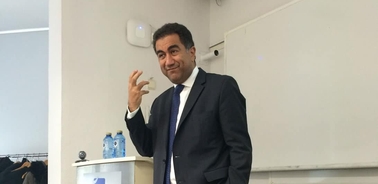- Home
- Youth Employment And The Empowering Of Women: Two Challenges For The Union For The Mediterranean
Youth employment and the empowering of women: two challenges for the Union for the Mediterranean

The end of 2015 marked the 20th anniversary of the Barcelona Process. That regional cooperative project was the origin of the Union for the Mediterranean (UfM), which was finally constituted in 2008 during the Paris Summit.
Fathallah Sijilmassi, Secretary General of the Union for the Mediterranean, visited IE School of International Relations to present this organization, which plays a key role in developing the region. The UfM is not strictly Mediterranean, as he put it in beginning of a talk in Riga (Latvia): “I’m very happy to be in a Mediterranean country.”
The reason for this remark is that all the countries in the European Union are automatically members of the UfM, whether they border on the Mediterranean or not. At present there are 43 countries in this organization, which also takes in North Africa and that part of the Near East closest to the Mediterranean.
As Sijilmassi explained, the role of the organization is to balance different interests with the aim of “promoting concrete projects.”
Among the fundamental aims of the UfM, Sijilmassi stressed creating employment for young people and empowering women. “What’s happening in Tunisia is very interesting. Everyone who is in the street demonstrating is saying ‘we want jobs.’ It’s not a question of politics or religion.”
Unemployment is also linked to other problems. Sijilmassi mentioned terrorism and insisted that everyone must work together to find solutions. It is here that education plays a fundamental role. In his native Morocco, the UfM has helped create the Euro-Mediterranean University of Fez, promoted by the Ministry for Education.
Empowering women is also related to employment. One of the ways to encourage it is for young women to create their own companies. “We’ve worked a lot in the big cities, but not enough in the interior or the rural areas,” Sijilmassi recognized, adding that the empowerment of women is an indicator of a country’s development.
Channels for concrete improvements
The Secretary General defines the UfM as a “yes” organization. “How do you take on challenges beyond just speeches and words, how do you meet the needs of people?” He says concrete projects must be carried out, “tangible things, not just theoretical approximations.”
To achieve this it’s often necessary to say ‘yes’ even though one isn’t entirely in agreement. The Union for the Mediterranean doesn’t implement projects on their own but rather facilitates them through third parties. The process begins by evaluating a project based on different criteria, such as its socio-economic value for the region, and then the financial experts determine how viable it will be, and the political waters are tested to be sure the project will be approved by the authorities. Afterward, the organization uses all the means at its disposal to promote the project and oversee its completion.